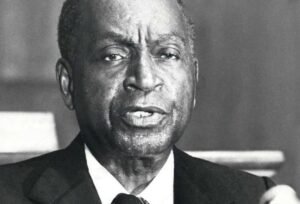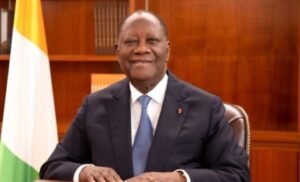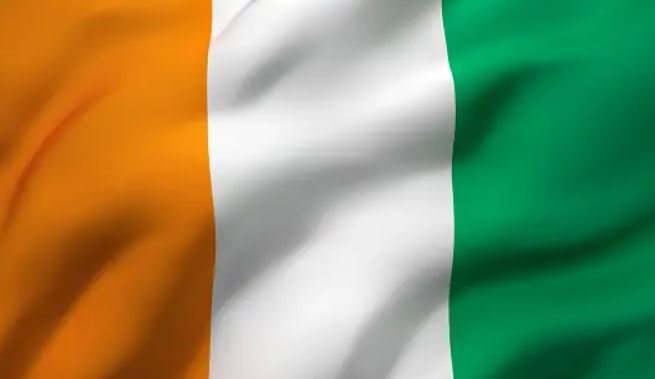This is a list of all the presidents who have served the Ivory Coast from 1960 till date, Including their terms, and political party:
No. | President | Term of Office | Political Party |
|---|---|---|---|
1 | Félix Houphouët-Boigny | 1960 - 1993 | Democratic Party of Ivory Coast (PDCI-RDA) |
2 | Henri Konan Bédié | 1993 - 1999 | Democratic Party of Ivory Coast (PDCI-RDA) |
3 | Robert Guéï | 1999 - 2000 | Military |
4 | Laurent Gbagbo | 2000 - 2011 | Ivorian Popular Front (FPI) |
5 | Alassane Ouattara | 2010 - Present | Rally of the Republicans (RDR) |
READ ALSO: List Of All Presidents Of Egypt (1953-Present)
Who Was The First President Of The Ivory Coast?

Félix Houphouët-Boigny was the first president of Ivory Coast, who served from the country’s independence in 1960 until he died in 1993. He was born on October 18, 1905, in Yamoussoukro.
His family was quite well-off since his father was a chief and a wealthy plantation owner. In his early career, Houphouët-Boigny worked as a medical aide and a tribal chief.
Later, he became involved in politics and started to fight for the rights of African farmers. In 1944, he founded a union for African farmers.
This union became the Democratic Party of Ivory Coast (PDCI-RDA) in 1946, which played a big part in the country’s politics. Houphouët-Boigny was very key in the fight for independence from French colonial rule.
In 1946, he was elected to the French National Assembly, where he spoke up for African interests. His hard work paid off when Ivory Coast gained autonomy in 1958 and full independence on August 7, 1960.
When the country became independent, he was elected as the first president of a one-party state. He stayed president for over thirty years.
As president, Houphouët-Boigny was known for his moderate policies and strong ties with France. He thought these ties were important for keeping the economy stable.
During his time as president, Ivory Coast’s economy grew a lot, especially in agriculture. The country became one of the world’s biggest exporters of cocoa and coffee.
His government focused on economic development, building infrastructure, and boosting agricultural production. However, not everything was perfect during his time in office.
Houphouët-Boigny kept a tight grip on power and did not allow much political opposition. His government was often called authoritarian.
He was also criticized for some of his foreign policy decisions, like getting involved in regional conflicts and supporting certain leaders in neighboring countries.
Félix Houphouët-Boigny died on December 7, 1993, leaving behind a mixed legacy. He is remembered as the founding father of the modern Ivory Coast, having set up its political and economic systems.
However, his authoritarian rule and the problems that came after his death still affect the country today. After he passed away, Henri Konan Bédié took over as president, during a time of political tension and unrest in Ivory Coast.
READ ALSO: Complete List Of Presidents Of Senegal
Current President Of Ivory Coast

Alassane Ouattara has been the President of Ivory Coast since May 2011. His election was very tense and led to a lot of problems in the country. Before him, Laurent Gbagbo was the president.
After a long crisis, Gbagbo was arrested and faced trial at the International Criminal Court for crimes against humanity. Ouattara is a member of the Rally of Houphouëtists for Democracy and Peace (RHDP).
Alassane Ouattara was born on January 1, 1942, in Dimbokro. He went to school in the United States and France and earned a Ph.D. in economics. Before returning to Ivory Coast, he worked at the International Monetary Fund (IMF) in different positions.
From 1990 to 1993, he served as the Prime Minister of Ivory Coast under President Félix Houphouët-Boigny. During his time as Prime Minister, he focused on economic reforms and tried to stabilize the economy.
As president, Ouattara has focused on economic development and infrastructure projects. These efforts have led to significant economic growth in Ivory Coast.
However, his administration has faced criticism for how it handles political dissent and human rights issues. In 2015, Ouattara was re-elected, but there were allegations of electoral irregularities.
His government has also been accused of suppressing opposition voices. In 2020, Ouattara decided to run for a controversial third term, which many critics said was unconstitutional.
The election was seen by violence and a boycott from opposition parties, creating a tense political climate. Despite these challenges, Ouattara won the election and has continued to push for economic reforms and investment in infrastructure.

